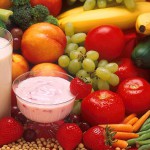What are good vegetarian dishes to have on Shabbat?
The following article by Rabbi Raymond Apple originally appeared in the Jerusalem Post on 9 December 2020.
 Now that non-besari (non-meaty) meat has come to Israel, many people will have to rethink their cuisine.
Now that non-besari (non-meaty) meat has come to Israel, many people will have to rethink their cuisine.
Some of us are already there. We are already hooked on meatless Mondays, but we don’t eat meat on Sunday either, or Tuesday, or any day of the week. Shabbat too? Definitely, though friends and guests can’t believe it.
“You don’t eat meat on Shabbat? Not even chicken?” They admit that our non-fleishig soups are really quite tasty; they even like our parve cholent; but they still wonder whether our food choices can really be kosher.
Apart from the urban myth that Shabbat and chickens go together, some people think there is a law that Shabbat is impossible without meat. Actually, the Bible’s original intention was for humans to eat vegetables, whichever day of the week it was (Genesis 1:29). The manna in the wilderness was vegetarian. People remembered the fruit and vegetables in Egypt (Numbers 11:5). Ahab wanted Naboth’s vineyard in order to plant a vegetable garden (I Kings 21:2).
For a true appreciation of vegetables we must go to the Talmud. Both the Babylonian (Sanhedrin 17b) and the Jerusalem Talmud (end of Kiddushin) speak highly of vegetable gardens. Rashi says that vegetables are inexpensive and healthy, and preparing them does not affect the time devoted to Torah study. Many rabbis believed that certain vegetables were good for health, though they knew that diarrhea might come from (presumably unwashed) vegetables. Poor people like Hillel appreciated being able to eat well on vegetables, though they dreamed of one day being able to afford meat (Shabbat 140b).
The Torah is not opposed to meat. It lists animals that may be eaten and how to slaughter them. It makes animal sacrifice part of Temple worship. Most people can’t imagine life without meat, though they know that when the Messiah comes they might have to be vegetarian. In the meantime, meat gives them fullness and satisfaction. They feel there is no joy without it (Pesachim 109a). Kabbalists even think that meat-eating elevates the animal.
What about meat on Shabbat? The Talmud says, “Eat meat sparingly.” (Chullin 84a). Pesachim 109a tells us, “Our rabbis said, ‘A person should make his children and household rejoice on a festival.’ With what does he make them rejoice? With wine. Rabbi Yehudah ben Batyra said, ‘When the Temple stood there was no rejoicing without meat, but now that the Temple no longer stands, there is no rejoicing except with wine, as it is said, ‘Wine gladdens the heart of man.’” (Psalm 104:15). The rule is not about meat but wine. Meat is not essential to joy. How can there be joy if meat eating causes distress?
Maimonides endorses meat eating on festivals “if one can afford it” (Hilchot Shabbat 30:10), implying that a different menu is acceptable if one is poor or if meat gives them no pleasure. The Shulchan Aruch says that those who fast every day would feel pain if they had to eat on Shabbat. Vegetarians would feel pain if they had to eat meat on Shabbat. (Shulchan Aruch, Orah Chayyim 288:1-3).
Don’t imagine that without meat you will get no protein. Vegetables are a good protein source. Good cooks can do wonders with them, whereas bad cooks can ruin vegetables as they can ruin anything. Seitan, tofu, mushrooms and other vegetarian staples encourage numberless imaginative recipes. Vegetarian Shabbat meals are quite practicable, enjoyable and filling.
The easy part is the entrée and soup, though when you say there are easy alternatives to chicken soup you might get disapproving mutters. In time you will construct your own list of main dishes, but here’s a (possibly idiosyncratic) list for starters. All are parve (non-dairy). If you’re invited out you can’t (and probably don’t want to) stop a host serving meat to other people, but perhaps they will want to try your vegetarian dishes, too, or instead.
• Nut loaf with vegetarian gravy
• Quiche with vegetable filling
• Filo or puff-pastry strudel with vegetable filling
• Filo parcels or wontons with vegetable filling
• Stuffed peppers (filling: flavored rice or farfel with vegetables)
• Stuffed mushrooms (filling: as with stuffed peppers)
• Eggplant schnitzels
• Filled eggplant (cut lengthwise, filled with flavored rice, tehina, etc.).
• Vegetarian moussaka (with eggplants and vegetarian mince)
• Vegetarian bolognaise (with vegetarian mince).
• Gluten goulash (using seitan or gluten flour).
• Tofu/vegetable stew.
• Vegetable kugel (potato, carrot, zucchini, etc.).
B’tayavon! Good Appetite! Shabbat Shalom!



